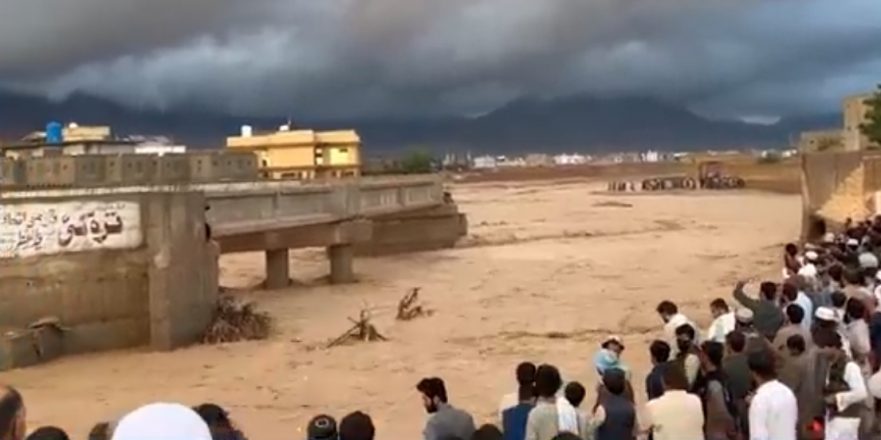The 230 million people of of Pakistan are living through an unprecedented disaster. By some accounts, one-third of their entire country has been flooded. The floods have torn through cities, valleys, housing complexes, and farms, often sweeping everything away. Uncounted thousands of people have been killed. (The total casualty toll is very far from being counted.) Most survivors are living in muck infested with sewage, bugs, and even snakes and have lost all their possessions.
The still images taken of this disaster do little convey its strength and horror. I urge people to search for and look at video records, such as this recent one from The Guardian. (The image above and many of the others here are screengrabs from that Guardian video.)
But apart from The Guardian, the coverage of this disaster in the corporate media of the rich ‘West’ has been paltry-to-nonexistent. Why???

This is particularly shocking because it is we, the peoples of rich ‘Western’ countries, who bear much of the responsibility, over the past 150 years, for the carbon emissions that sparked the massive recent climate events (first, abnormal heat; then, abnormal rainfall and glacial melting) that led to this unprecedented flooding.
What happened to all those promises that rich nations made at the “COP-26” climate summit in Glasgow, just seven months ago? (I guess that ‘Western’ leaders got distracted by the war in Ukraine– itself a major climate-battering event. But really, that is no excuse…)
The Government of Pakistan needs considerable help from the U.N. and the rest of the international community in order to even start to dig out from his terrible disaster– which is all the more poignant because 5,500 years ago the Indus Valley, which is the main conduit for today’s flooding, was the place where “civilization” itself, in terms of urban planning, sewage systems, and sturdy building technologies, first got incubated.
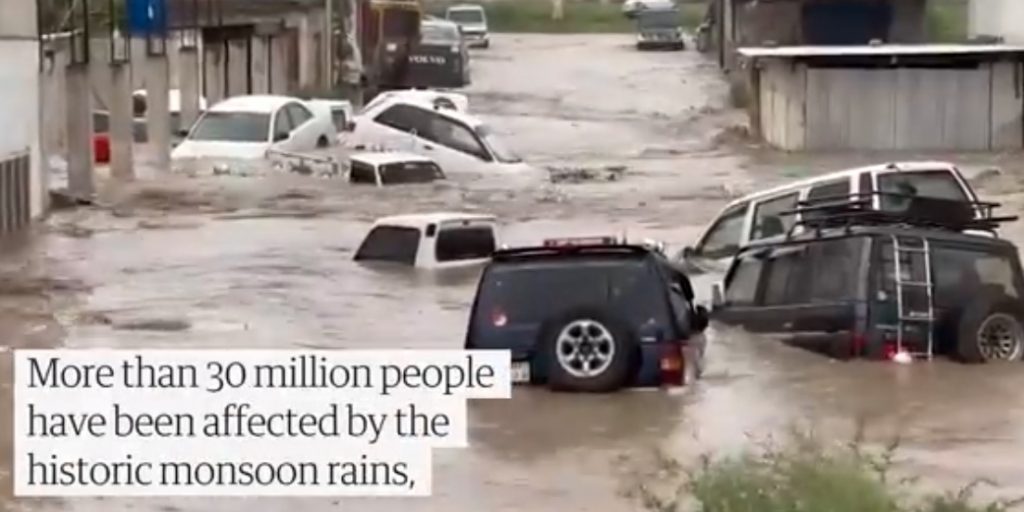
But Pakistan, its neighbors (also affected by these floods), and the rest of the Global South need a lot more than just a set of “humanitarian emergency” Band-aids. As the country’s Minister for Climate Change, Sherry Rehman, and others have argued, what the peoples of the Global South need is a real commitment from the rich ‘Western’ countries to perform on, and to go considerably beyond, the promises they made in Glasgow.
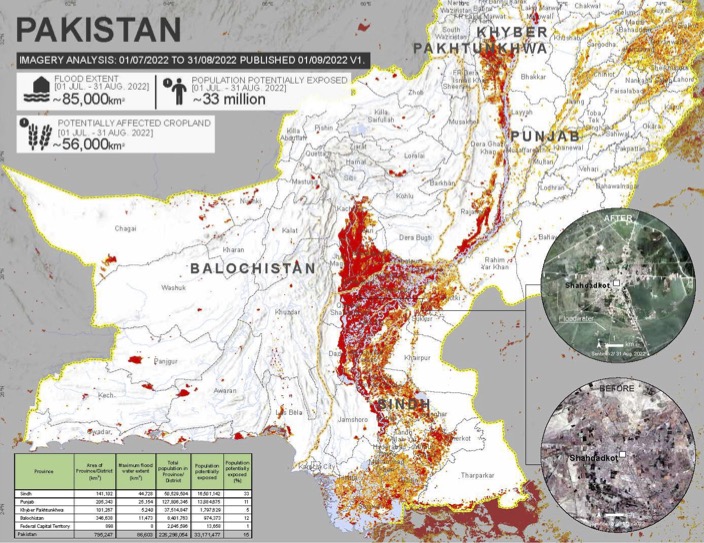
As she told The Guardian recently:
There is so much loss and damage with so little reparations to countries that contributed so little to the world’s carbon footprint that obviously the bargain made between the global north and global south is not working. We need to be pressing very hard for a reset of the targets because climate change is accelerating much faster than predicted, on the ground, that is very clear.
…
Historic injustices have to be heard and there must be some level of climate equation so that the brunt of the irresponsible carbon consumption is not being laid on nations near the equator which are obviously unable to create resilient infrastructure on their own.
The Guardian also recently hosted this hard-hitting opinion piece from Pakistani Senator Mustafa Nawaz Khokar. He argued:
The results of western economies’ inertia and apathy are now glaringly obvious. Pakistan contributes less than 1% in global emissions and yet it is one of the countries most at risk due to climate change and global heating. We can only hope that Cop27, which will be held this year in Egypt, won’t fall short on expectations. But we’ve been here before: at Cop26, the response of major polluters failed to match the scale of the climate crisis.
Actually, the disparity in responsibility for the climate crisis is much greater than would be indicated by looking just at current CO2 emission levels. There is also, as Vijay Prashad and many others have argued, the whole legacy of the past 150-plus years of industrial activity in the ‘West’ needs to be taken into account.
If we look just at a recent-ish, 20-year slice of that record, as New Internationalist did a few years ago, you can see the disparities. In that period 1990-2010, the United States emitted some 30 Giga-tonnes of CO2 that “corresponded to consumption above the development threshold”, while Pakistan didn’t even feature in the graph: It was lumped in with all the other “LDCs”, which between them didn’t emit any CO2 “above the development threshold” in that period.
Those of us who enjoy the more-than-sufficient material circumstances of the rich ‘Western’ countries thus have numerous responsibilities to our sisters and brothers in Pakistan and the other countries of the Global South. A very preliminary response today would be to make a donation, as you are able, to the World Food Program’s emergency program for Pakistan. Another would of course be to step up our efforts to reduce both our own personal carbon footprints, and those of the communities in which we live.
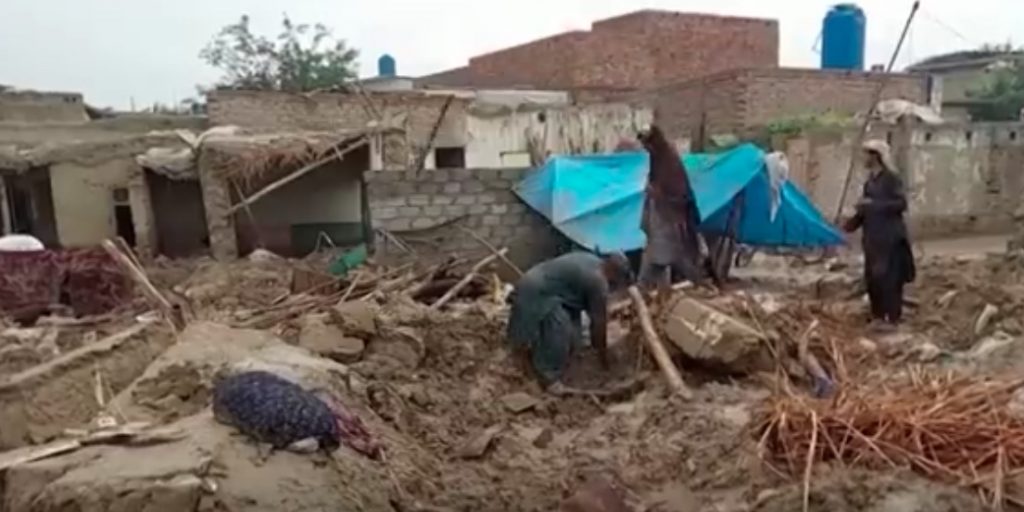
Beyond that, we need to work at the political level to try to push our governments to do two important things:
- To follow through on all the promises made in Glasgow! The next UN climate change Conference of Parties, COP-27, is coming up this November, in Egypt. We should all stay up-to-date on the issues and work to keep the pressure up on our representatives there.
- To end the fighting in Ukraine at speedily as possible! This fighting has caused more than enough devastation, in Ukraine and far beyond. It threatens nuclear annihilation. It has polarized the world at a time when all peoples need to come together to tackle the climate crisis. The fighting has itself increased CO2 emissions. A negotiated ceasefire is certainly possible. But ‘Western’ governments have blocked all ceasefire effects and just seem to want to keep the war going. That needs to change.
Then, looking even more deeply into “What Is To Be Done?”, we should start connecting with the deep exploring that some visionary thinkers are already doing in two crucial areas: the Reparations that ‘Western’ nations need to make to the once-colonized, long-pillaged nations of the Global South; and the whole bigger issue of making the turn to Degrowth.
I have long been convinced that two harmful shibboleths of ‘Western’ capitalist society that need to be interrogated– and deconstructed– are the shibboleth of “choice” (in consumption, if not always into the disposition of one’s own body…) and that of economic “growth”. Now, thank goodness, there is a growing movement that seeks to upend the latter of these.
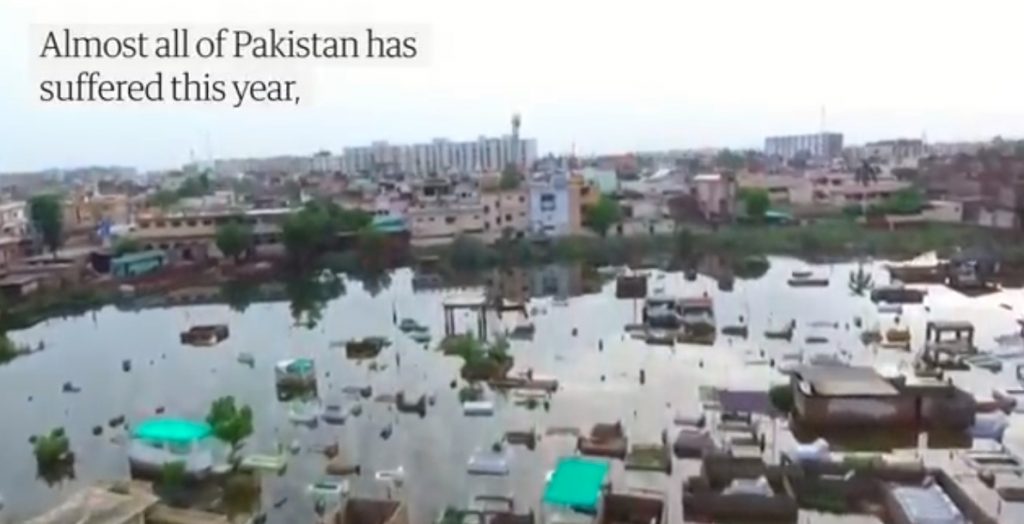
In Vijay Prashad‘s latest newsletter on the climate crisis he explained the importance of “Degrowth for Western countries” in the following terms:
With less than 5% of the world’s population, the United States consumes a third of the world’s paper, a quarter of the world’s oil, nearly a quarter of the world’s coal, and a quarter of its aluminium. The Sierra Club says that US per capita consumption ‘of energy, metals, minerals, forest products, fish, grains, meat and even fresh water dwarfs that of people living in the developing world’. Western countries need to cut back on their overall consumption, scaling back, as Jason Hickel notes, the ‘unnecessary and destructive ones’ (such as the fossil fuel and arms industries, the production of McMansions and private jets, the manner of industrial beef production, and the entire business philosophy of planned obsolescence).
The London Review of Books had an excellent, 50-minute podcast discussion of the issue of “Green Growth and Degrowth” this past week. Well worth listening to! I think the review article on which it was based is here.
So: Lots of learning to do. Lots of deep thinking. Lots of organizing.
But I return to the question with which I started here: Why do we see almost none of these issues addressed in the corporate media here in the United States? And the much graver issue remains: Why have these media paid almost no attention to the (still unfolding and worsening) human catastrophe in Pakistan?
The numbers of people– our fellow-humans– whose lives have been lost or completely upended in the past two months in Pakistan is several orders of magnitude greater than the numbers of people similarly afflicted in Ukraine over the past half-year. Yet the crisis in Ukraine has devoured the attention of the big media here in Turtle Island, where it is hard to find any mention of Pakistan’s woes.
Skin color has to have been a factor in those choices. (Imagine if the people of Slovakia, Poland, or Spain had suffered from flooding on this scale…) But another factor was probably the fact that the Military-Industrial Complex, which has such close ties to the major media here, sees no particular profit in addressing the flooding-caused suffering of people so far away.

